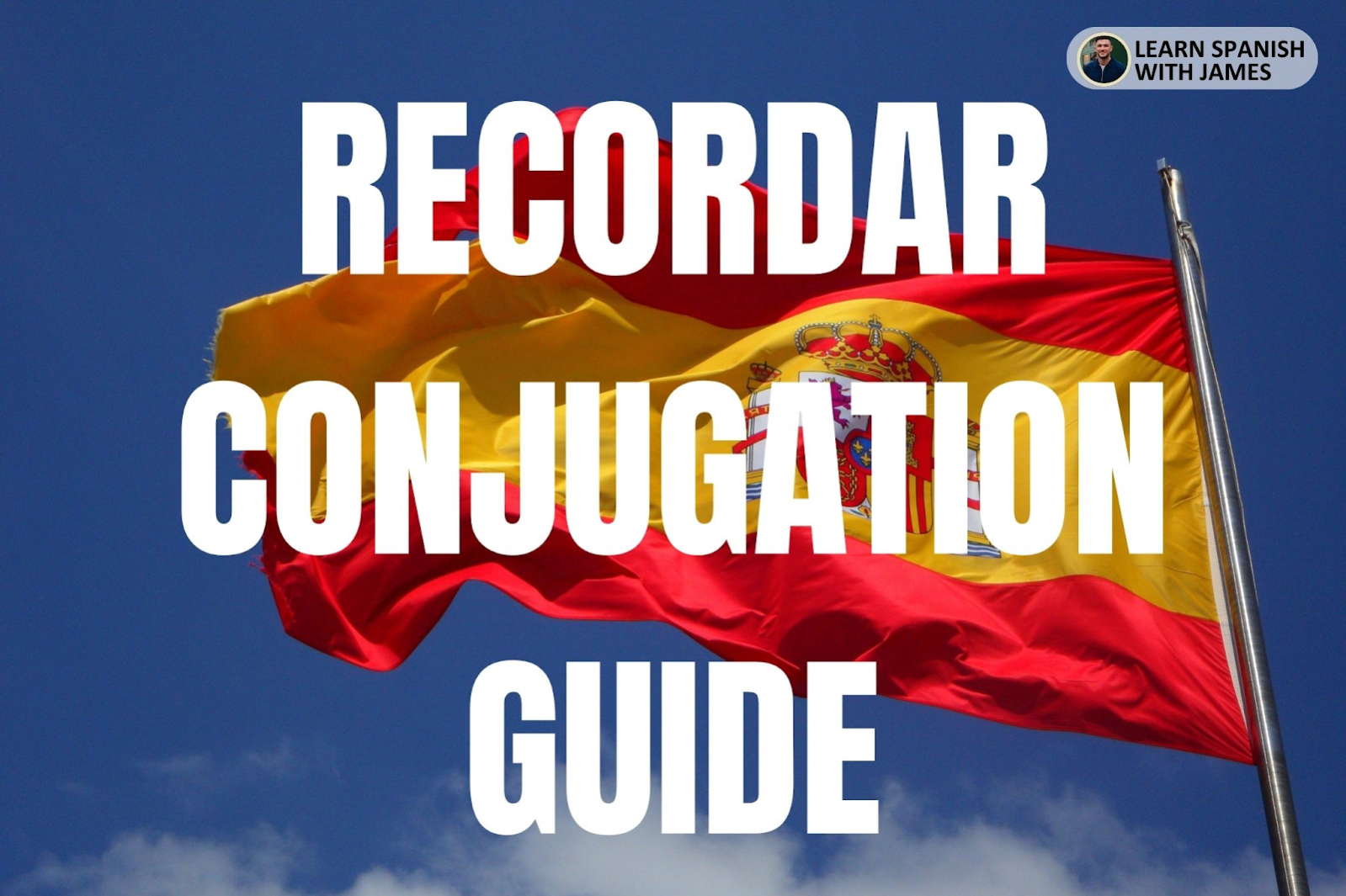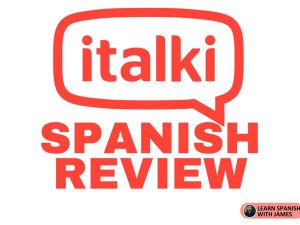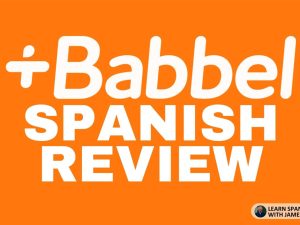Recordar Conjugation Chart & Full Tense Guide

“Recordar” is an irregular Spanish verb meaning “to remember,” “to remind,” or “to recall.” As an irregular verb, it can be challenging for learners trying to master each “recordar” verb conjugation.
I’m James, from Learn Spanish With James, and the host of the Learn Spanish With James Podcast.
In this guide, you’ll learn every “recordar” conjugation across various tenses and moods, from the indicative to the subjunctive and imperative.
So, read on to learn how to conjugate “recordar” in Spanish, in every existing tense.
Present Tense
Pronouns Pronombres Conjugation
I yo recuerdo
you tú recuerdas
he,she,it, you(formal) él,ella,usted recuerda
we nosotros,nosotras recordamos
you pl. vosotros, vosotras recordáis
they, you pl. (formal) ellos,ellas,ustedes recuerdan
When We Use the Present Tense
The present tense in Spanish is used to describe actions that are habitual actions, and general truths.
In the case of the Spanish verb “recordar”, it indicates remembering or recalling something.
For example, “I remember” or “you remember”.
The other present tense – present continuous in Spanish (“estoy recordando”) is used for ongoing actions.
Examples of “Recordar” in the Present Tense
- Yo recuerdo los buenos momentos. (I remember the good times.)
- Tú recuerdas su nombre. (You remember his/her name.)
- Él/Ella recuerda la cita. (He/She remembers the appointment.)
- Nosotros recordamos las fechas importantes. (We remember the important dates.)
- Vosotros recordáis las lecciones anteriores. (You all remember the previous lessons.)
- Ellos/Ellas recuerdan la conversación. (They remember the conversation.)
Preterite Tense
Pronouns Pronombres Conjugation
I yo recordé
you tú recordaste
he, she. it, you (formal) él, ella, usted recordó
we nosotros, nosotras recordamos
you (plural) vosotros, vosotras recordasteis
they, you (pl. formal) ellos, ellas, ustedes recordaron
When We Use the Preterite Tense
The preterite tense in Spanish allows us to express actions that were completed in the past at a fixed point in time.
If we look at “recordar” as an example, the preterite tense allows us to say that we remember or recall a specific event or action that occurred and concluded at a definite point in the past.
This means it differs from the imperfect tense, which we’ll come on to shortly. I discuss the differences in this guide to Spanish verb tenses.
Despite its stem change in some tenses, every “recordar” conjugation in the preterite tense follows the regular -AR verb pattern.
You can familiarize yourself with this pattern by viewing the “recordar” conjugation verb chart above, as well as the following conjugation guides: “encontrar“, “hablar“, “llamar“, “pensar“, “perdonar“, “tomar“, and “dejar“.
Examples of the Preterite Spanish Verb Conjugation for “Recordar”
- Yo recordé su cumpleaños. (I remembered his/her birthday.)
- Tú recordaste lo que pasó. (You remembered what happened.)
- Él/Ella recordó la lección. (He/She remembered the lesson.)
- Nosotros recordamos el evento. (We remembered the event.)
- Vosotros recordasteis el momento importante. (You all remembered the important moment.)
- Ellos/Ellas recordaron el viaje. (They remembered the trip.)
Imperfect Tense
Pronouns Pronombres Conjugation
I yo recordaba
you tú recordabas
he, she, it, you (formal) él, ella, usted recordaba
we nosotros, nosotras recordábamos
you (plural) vosotros, vosotras recordabais
they, you(pl. formal) ellos, ellas, ustedes recordaban
When We Use the Imperfect Tense
The imperfect tense Spanish verb conjugation is used to describe ongoing or repeated past actions without focusing on their beginning or end.
When conjugating “recordar” in this tense, it denotes remembering or recalling something in the past without specifying a definite endpoint.
Each Spanish verb conjugation in the imperfect tense is listed below.
Top Tip: I learned this tense by thinking of the phrase “I used to like ABBA”. The imperfect tense means ‘used to’ and -AR verb endings in this tense are ‘aba’.
Examples of “Recordar” in the Imperfect Tense
- Yo recordaba a mi abuelo. (I used to remember my grandfather.)
- Tú recordabas los días felices. (You used to remember the happy days.)
- Él/Ella recordaba su infancia. (He/She remembered his/her childhood.)
- Nosotros recordábamos las tradiciones familiares. (We remembered the family traditions.)
- Vosotros recordabais las canciones populares. (You all remembered the popular songs.)
- Ellos/Ellas recordaban los viejos tiempos. (They remembered the old times.)
Future Tense
Pronouns Pronombres Conjugation
I yo recordaré
you tú recordarás
he,she,it, you(formal) él,ella,usted recordará
we nosotros,nosotras recordaremos
you pl. vosotros, vosotras recordaréis
they, you pl. (formal) ellos,ellas,ustedes recordarán
When We Use the Future Tense
The future tense in Spanish indicates actions that will happen in the future.
For example, “I will remember” or “we will remember”.
In order to conjugate “recordar” in the future tense, we need to add each relevant ending to the infinitive form.
Simple, right? We do not need to change the stem of the verb, as you will see in the “recordar” conjugation chart above.
So, although “recordar” is an irregular verb, the future tense follows a very predictable pattern in the future tense.
Examples of “Recordar” in the Future Tense
- Yo recordaré este día para siempre. (I will remember this day forever.)
- Tú recordarás nuestras conversaciones. (You will remember our conversations.)
- Él/Ella recordará su promesa. (He/She will remember his/her promise.)
- Nosotros recordaremos tus palabras. (We will remember your words.)
- Vosotros recordaréis los momentos felices. (You all will remember the happy moments.)
- Ellos/Ellas recordarán sus logros. (They will remember their achievements.)
Conditional Tense
Pronouns Pronombres Conjugation
I yo recordaría
you tú recordarías
he,she,it, you(formal) él,ella,usted recordaría
we nosotros,nosotras recordaríamos
you pl. vosotros, vosotras recordaríais
they, you pl. (formal) ellos,ellas,ustedes recordarían
When We Use the Conditional Tense
The conditional tense in Spanish is used to express actions that would happen under certain conditions or to convey hypothetical situations.
It means “I would remember” or “they would remember”.
Each “recordar” conjugation in this tense is very easy to learn, just like the future tense, because all you need to do is add the relevant endings to the infinitive form.
Top Tip: I learned this tense and the imperfect subjunctive tense at the same time. You can use both tenses in the same sentence. This will help you score top marks in speaking exams!
Examples of “Recordar” in the Conditional Tense
- Yo recordaría tu nombre si me lo dijeras. (I would remember your name if you told me.)
- Tú recordarías la canción si la escucharas. (You would remember the song if you listened to it.)
- Él/Ella recordaría el número si lo viera. (He/She would remember the number if he/she saw it.)
- Nosotros recordaríamos el plan si lo tuviéramos. (We would remember the plan if we had it.)
- Vosotros recordaríais el lugar si lo visitarais. (You all would remember the place if you visited it.)
- Ellos/Ellas recordarían la fecha si se la recordaran. (They would remember the date if it were reminded to them.)
Perfect Tense
Pronouns Pronombres Auxiliary verb ‘haber’ Past Participle
I yo he recordado
you tú has recordado
he,she,it, you(formal) él,ella,usted ha recordado
we nosotros,nosotras hemos recordado
you pl. vosotros, vosotras habéis recordado
they, you pl. (formal) ellos,ellas,ustedes han recordado
When We Use the Perfect Tense
The perfect tense in Spanish, also known as the pretérito perfecto tense, is our first use case of the verb “haber”. And I’ll show you how shortly.
This tense allows us to state that something ‘has happened’.
When conjugating the Spanish verb “recordar” in the perfect tense, we need to conjugate “haber” (as per the “recordar” conjugation chart above), and then use the past participle of “recordar”. This becomes “recordado”.
Top Tip: All -AR verbs follow the same pattern in the past participle, becoming -ado. For example, if we look at the “dejar” conjugation, it becomes “dejado”, “estar” becomes “estado”, “tomar” becomes “tomado” etc.
Examples of “Recordar” in the Perfect Tense
- Yo he recordado tu consejo. (I have remembered your advice.)
- Tú has recordado tus promesas. (You have remembered your promises.)
- Él/Ella ha recordado los detalles importantes. (He/She has remembered the important details.)
- Nosotros hemos recordado el camino. (We have remembered the way.)
- Vosotros habéis recordado la contraseña. (You all have remembered the password.)
- Ellos/Ellas han recordado sus raíces. (They have remembered their roots.)
Pluperfect Tense
Pronouns Pronombres Auxiliary verb ‘haber’ Past Participle
I yo había recordado
you tú habías recordado
he,she,it, you(formal) él,ella,usted había recordado
we nosotros,nosotras habíamos recordado
you pl. vosotros, vosotras habíais recordado
they, you pl. (formal) ellos,ellas,ustedes habían recordado
When We Use the Pluperfect Tense
The pluperfect tense in Spanish is used to describe actions that had been completed before another past action or point in time.
For example, “I had already remembered to pick her up before her mother reminded me”.
So, when conjugating “recordar” in this tense, we indicate remembering or recalling something that had already happened before another past event.
In order to form each “recordar” conjugation in the pluperfect tense, we need to conjugate “haber” again, and then use the past participle “recordado”.
Examples of “Recordar” in the Pluperfect Tense
- Yo había recordado su nombre antes de verlo. (I had remembered his/her name before seeing him/her.)
- Tú habías recordado la cita antes de que comenzara. (You had remembered the appointment before it started.)
- Él/Ella había recordado la lección antes del examen. (He/She had remembered the lesson before the exam.)
- Nosotros habíamos recordado el incidente antes de la reunión. (We had remembered the incident before the meeting.)
- Vosotros habíais recordado la dirección antes de salir. (You all had remembered the address before leaving.)
- Ellos/Ellas habían recordado el plan antes de la llegada de los invitados. (They had remembered the plan before the arrival of the guests.)
Future Perfect Tense
Pronouns Pronombres Auxiliary verb ‘haber’ Past Participle
I yo habré recordado
you tú habrás recordado
he,she,it, you(formal) él,ella,usted habrá recordado
we nosotros,nosotras habremos recordado
you pl. vosotros, vosotras habréis recordado
they, you pl. (formal) ellos,ellas,ustedes habrán recordado
When We Use the Future Perfect Tense
The future perfect tense in Spanish is used to express actions that will have been completed by a certain point in the future.
Conjugating the Spanish verb “recordar” in this tense allows us to signify that we remember or recall something that will have occurred before a specified future time.
With this verb, it’s not common to use the future perfect tense. Even so, it’s worth learning each “haber” conjugation via the conjugation chart above.
Top Tip: Even when you are using -ER verbs and -IR verbs in the past participle, the conjugation of “haber” will always stay the same.
Examples of [Recordar] in the Future Perfect Tense
- Yo habré recordado tu nombre para cuando llegue la hora de la graduación. (I will have remembered your name by the time graduation comes around.)
- Tú habrás recordado la dirección para la fiesta. (You will have remembered the address for the party.)
- Él/Ella habrá recordado las instrucciones para entonces. (He/She will have remembered the instructions by then.)
- Nosotros habremos recordado los detalles para la presentación. (We will have remembered the details for the presentation.)
- Vosotros habréis recordado las reglas para el juego. (You all will have remembered the rules for the game.)
- Ellos/Ellas habrán recordado los preparativos para la ceremonia. (They will have remembered the preparations for the ceremony.)
Conditional Perfect Tense
Pronouns Pronombres Auxiliary verb ‘haber’ Past Participle
I yo habría recordado
you tú habrías recordado
he,she,it, you(formal) él,ella,usted habría recordado
we nosotros,nosotras habríamos recordado
you pl. vosotros, vosotras habríais recordado
they, you pl. (formal) ellos,ellas,ustedes habrían recordado
When We Use the Conditional Perfect Tense
The conditional perfect tense in Spanish is used to express actions that would have been completed under certain conditions in the past.
For each “recordar” conjugation in this tense, we indicate that we would have remembered or recalled.
For example, “She would have remembered to text me if she hadn’t been so busy with her new boyfriend!”.
Examples of Recordar in the Conditional Perfect Tense
- Yo habría recordado el evento si hubiera recibido la invitación. (I would have remembered the event if I had received the invitation.)
- Tú habrías recordado la conversación si hubieras estado presente. (You would have remembered the conversation if you had been present.)
- Él/Ella habría recordado el nombre si hubiera visto la lista. (He/She would have remembered the name if he/she had seen the list.)
- Nosotros habríamos recordado el plan si hubiéramos estado juntos. (We would have remembered the plan if we had been together.)
- Vosotros habríais recordado el mensaje si hubierais revisado el correo. (You all would have remembered the message if you had checked the mail.)
- Ellos/Ellas habrían recordado el compromiso si hubieran recibido la notificación. (They would have remembered the commitment if they had received the notification.)
Present Subjunctive
Pronouns Pronombres Conjugation
I yo recuerde
you tú recuerdes
he,she,it, you(formal) él,ella,usted recuerde
we nosotros,nosotras recordemos
you pl. vosotros, vosotras recordéis
they, you pl. (formal) ellos,ellas,ustedes recuerden
When We Use the Present Subjunctive
The present subjunctive in Spanish is used to express desires, doubts, or uncertainties regarding actions.
It’s too complex to explain in just one or two sentences, but use the “recordar” conjugation chart above to learn each relevant form.
Examples of Recordar in the Present Subjunctive
- Es importante que recuerde los nombres. (It is important that I remember the names.)
- Espero que recuerdes la fecha. (I hope you remember the date.)
- Dudo que él/ella recuerde la canción. (I doubt he/she remembers the song.)
- Sugiero que nosotros recordemos el compromiso. (I suggest we remember the commitment.)
- Insisto en que vosotros recordéis la tarea. (I insist that you all remember the homework.)
- Recomiendo que ellos/ellas recuerden las indicaciones. (I recommend they remember the instructions.)
Imperfect Subjunctive
Pronouns Pronombres Conjugation
I yo recordara, recordase
you tú recordaras, recordases
he,she,it, you(formal) él,ella,usted recordara, recordase
we nosotros,nosotras recordáramos, recordásemos
you pl. vosotros, vosotras recordarais, recordaseis
they, you pl. (formal) ellos,ellas,ustedes recordaran, recordasen
When We Use the Imperfect Subjunctive
Just like the present subjunctive, the imperfect subjunctive in Spanish is used to express hypothetical situations, wishes, or doubts.
However, this time it’s for past tense usage, so we use it to express these hypothetical situations about past actions.
Examples of Recordar in the Imperfect Subjunctive
- Si recordara su nombre, se lo diría. (If I remembered his/her name, I would tell him/her.)
- No creía que recordaras el evento. (I didn’t think you remembered the event.)
- Ojalá recordara las palabras exactas. (I wish he/she remembered the exact words.)
- Si recordara el guión, no habría tenido tanta vergüenza. (If I had remembered the script, I wouldn’t have been so embarrassed.)
- Dudaba que recordáramos la dirección. (I doubted we remembered the address.)
- Si ella recordara la cita, no llegaría tarde. (If she remembered the appointment, she wouldn’t be late.)
Affirmative Imperative
Pronouns Pronombres Conjugation
you tú ¡recuerda!
he,she,it, you(formal) él,ella,usted ¡recuerde!
we nosotros,nosotras ¡recordemos!
you pl. vosotros, vosotras ¡recordad!
they, you pl. (formal) ellos,ellas,ustedes ¡recuerden!
When We Use The Affirmative Imperative
The imperative form of the verb “recordar” has the same stem as the preterite for the first person plural and one form of the second person plural – the verb stem + -emos , -ad (imperative endings).
It is important to remember that there is no imperative form in the first person singular (yo) or in the singular forms of the third person (él/ella).
Examples of How to Conjugate “Recordar” in the Affirmative Imperative
- (Tú) Recuerda la fecha. (Remember the date.)
- (Usted) Recuerde la cita. (Remember the appointment.)
- (Nosotros) Recordemos los detalles. (Let’s remember the details.)
- (Vosotros) Recordad el nombre. (Remember the name.)
- (Ustedes) Recuerden el evento. (Remember the event.)
Negative Imperative
Pronouns Pronombres Conjugation
you tú ¡no recuerdes!
he,she,it, you(formal) él,ella,usted ¡no recuerde!
we nosotros,nosotras ¡no recordemos!
you pl. vosotros, vosotras ¡no recordéis!
they, you pl. (formal) ellos,ellas,ustedes ¡no recuerden!
When We Use The Negative Imperative
The negative imperative is used to give commands or orders in a direct and negative manner.
In this case, we are instructing someone to not remember a particular thing in a certain way.
Examples of How to Conjugate “Recordar” in the Negative Imperative
- (Tú) No recuerdes el pasado. (Don’t remember the past.)
- (Usted) No recuerde ese incidente. (Don’t remember that incident.)
- (Nosotros) No recordemos los errores. (Let’s not remember the mistakes.)
- (Vosotros) No recordéis las dificultades. (Don’t remember the difficulties.)
- (Ustedes) No recuerden ese momento. (Don’t remember that moment.)
Online Spanish Courses & Grammar Courses
I hope you found this “recordar” conjugation guide useful.
For a full list of Beginner, Intermediate and Advanced Courses, check out this full list of online Spanish courses.
I put this list together myself, and it comprises a mixture of courses that offer Spanish grammar practice for all levels, conversational practice, listening and writing exercises in Spanish, free Spanish courses, and a whole lot more.
The fastest way to learn Spanish is to test a mixture of Spanish resources and choose the course that coincides most with your learning style.
In addition to online Spanish courses, on this site you will find a wide range of Spanish podcasts, Spanish apps, Spanish YouTube channels, and both online and physical Spanish language schools.

About James – Or Should that be Santiago?
My name is James. I am a Brit with a love for the Spanish language. I have lived in Spain, Argentina, and Costa Rica, and I have been teaching Spanish for over a decade. This site will show you how to master the elements of Spanish grammar that often dishearten learners. I hope you enjoy the site and find it useful.
If you are interested in taking your Spanish to the next level, check out the Courses section for a full list of the Spanish courses I suggest. All reviews are based on my personal opinions.







